Denmark

Aarhus University (AU) was founded in 1928. It has 40,000 students; about 1,800 PhD students - of which one in four has a foreign nationality - and close to 900 postdoctoral scholars together with 11,500 employees. AU has four faculties which cover the entire research spectrum – basic research, applied research, strategic research and research based advice to the authorities.
AU has been establishing itself as a university for cutting-edge research, and has been moving up the most important university ranking lists. In 2018 the university was ranked at number 101 at the Leiden Ranking, number 119 at the QS World University Ranking, and number 109 of 17,000 universities on the Times Higher Education World University Ranking).
The university’s goal is to contribute towards solving the complex global challenges facing the world. The university therefore strives to combine the high level of academic standards of its researchers with collaboration across disciplinary boundaries to combine research in new ways.
The Faculty of Arts and the School of Communication and Culture where the Departments of English and of German and Romance Languages (French, Italian, Spanish and German) represent the strongest language environment in Denmark. More precisely, both departments offer two main types of degree programmes: language and culture programmes within the humanities, and business communication programmes.
Further information and key figures can be found on the Aarhus University webpage and on the Faculty of Arts profile page.
 As of September 2017, the university also hosts the Danish National Center for Foreign Languages, established as part of the Government’s National Strategy for Foreign Languages in the Educational System. (The center has two sections, the other being hosted at the University of Copenhagen.) Among the center’s main goals are: 1) motivating more students to become more skilled in more languages; 2) attracting more students to language degree programmes; 3) securing high-quality language education at all levels in the educational system. The center has an initial appropriation of DKK 100 million (EUR 15 million) over five years. The center also hosts the Danish Contact Point for the European Center for Modern Languages, whose headquarter is in Graz.
As of September 2017, the university also hosts the Danish National Center for Foreign Languages, established as part of the Government’s National Strategy for Foreign Languages in the Educational System. (The center has two sections, the other being hosted at the University of Copenhagen.) Among the center’s main goals are: 1) motivating more students to become more skilled in more languages; 2) attracting more students to language degree programmes; 3) securing high-quality language education at all levels in the educational system. The center has an initial appropriation of DKK 100 million (EUR 15 million) over five years. The center also hosts the Danish Contact Point for the European Center for Modern Languages, whose headquarter is in Graz.
Norway
 The Norwegian National Centre for English and Foreign Languages in Education (The Foreign Language Centre) is one of several national centres under The Norwegian Ministry of Education and Research. The Centre’s mandate is to implement and execute national education policy to enable all children, adolescents and adults to receive equal and adapted education and training of high quality in an inclusive environment.
The Norwegian National Centre for English and Foreign Languages in Education (The Foreign Language Centre) is one of several national centres under The Norwegian Ministry of Education and Research. The Centre’s mandate is to implement and execute national education policy to enable all children, adolescents and adults to receive equal and adapted education and training of high quality in an inclusive environment.
The Foreign Language Centre is a national resource centre for English and other foreign language education in kindergartens, primary school and secondary school and its mandate is to improve the quality of foreign language education and give the teaching a practical and varied content. As a national resource centre, The Foreign Language Centre shall also help increase motivation for and interest in foreign languages.
Teachers, school managers, kindergarten- and school owners and pedagogical staff in kindergartens are the key target groups for the Centre’s activities. The Centre work with higher education institutions and universities (primarily teacher training institutions) in their efforts to realise national initiatives that promote competence development.
The Centre is a national centre and is located at the Østfold University College in the south-eastern part of Norway, 120 km from Oslo. Østfold University College is a major institution in foreign language learning in Norway, with academic courses and degrees in English, Spanish, German and French as well as teacher training programmes.
For more information about the Centre visit the Fremmedspråksenteret website and the Østfold University College website (the site is available in English and Norwegian).

